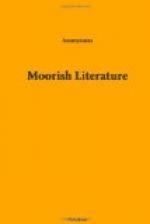We will recite the story of a young man
In Berbere; O God, give to us perfection;
That which we bring to you is found in truthful tradition,
Hard as a rock though thy heart be, it will melt;
The father and mother of Saba died in his childhood
And left him in great poverty;
Our compassionate Lord guided him and showed him the way,
God led him along toward the Prophet,
And gave to him the Koran."[5]
[5] R. Basset, Le Poeme de Sabi, p. 15 et suis. Paris, 1879.
Other poems—for instance, that of Sidi Hammen and that of Job—are equally celebrated in Morocco. The complaints on religious subjects are accompanied on the violin, while those treating of a historical event or a story with a moral have the accompaniment of a guitar. We may class this kind of poems among those called Tandant, in lower Morocco, which consist in the enumeration of short maxims. The same class exist also in Zouaona and in Touareg.
But the inspiration of the Khabyle poets does not always maintain its exaltation. Their talents become an arm to satirize those who have not given them a sufficiently large recompense, or—worse still, and more unpardonable—who have served to them a meagre repast:
“I went to the home of vile animals,
Ait Rebah is their name;
I found them lying under the sun like
green figs,
They looked ill and infirm.
They are lizards among adders,
They inspire no fear, for they bite not.
Put a sheepskin before them, they
Will tear your arms and hands;
Their parched lips are all scaly,
Besides being red and spotted.
“As the vultures on their dung heaps,
When they see carrion, fall upon it,
Tearing out its entrails,
That day is for them one of joy.
Judging by their breeches,
And the headdresses of their wives,
I think they are of Jewish origin."[6]
[6] Hanoteau, Poemes Populaires de la Khabyle, pp. 179-181, Du Jurgura.
This song, composed by Mohammed Said or Aihel Hadji, is still repeated when one wishes to insult persons from Aith Erbah, who have tried several times to assassinate the poet in revenge.
Sometimes two rival singers find themselves together, and each begins to eulogize himself, which eulogy ends in a satire on the other. But the joust begun by apostrophes and Homeric insults finishes often with a fight, and the natural arm is the Basque drum until others separate, the adversaries.[7] We have an example in a dialogue of this kind between Youssuf ou Kassi, of the Aith Djemnad, and Mohand ou Abdaha, of the Aith Kraten. The challenge and the jousts—less the blows—exist among the chellahs of lower Morocco, where they are called Tamawoucht; but between man and woman there is that which indicates the greatest liberty of manners. The verses are improvised, and the authors are paid in small money. Here is a specimen:




